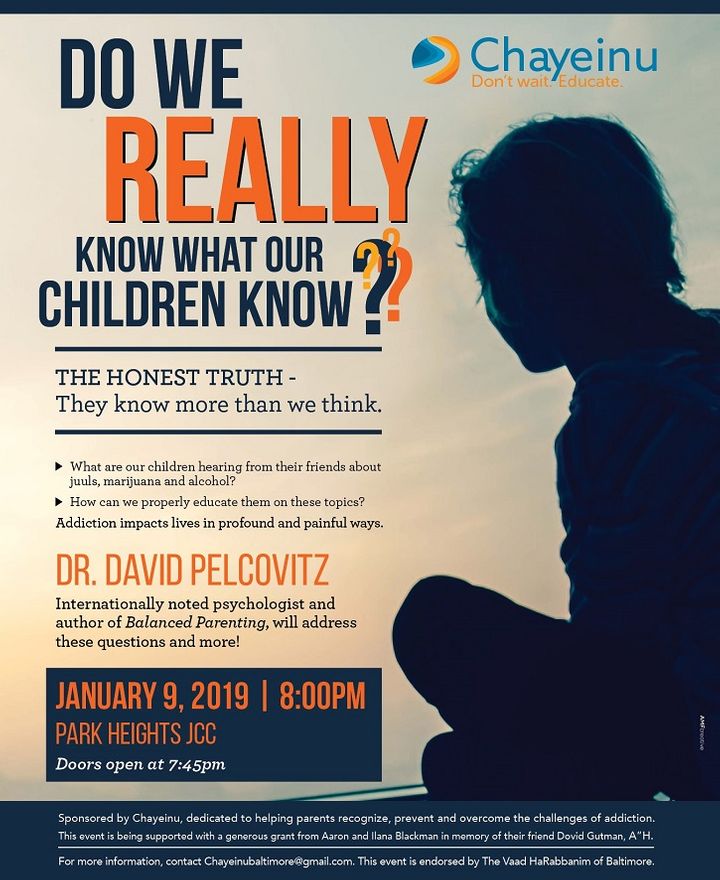- Several yeshiva boys stand around the kiddush table at shul, with one of them serving as the official lookout; they take shots every time they think that no adults are watching.
- Middle school students are talking about a YouTube video that says vaping with e-cigarettes is harmless…and maybe even good for you.
- A high school girl has a friend who has become a regular Juul user, and finally gives in to daily invitations to “just try one of my marijuana pods”
- A third-grade boy accompanies his father home from shul on Shabbos, stopping at several “kiddush clubs” where he observes grown men behaving in ways that make him think drinking is fun and good.
All of these scenarios have happened in the orthodox community of Baltimore. In response, a group of parents, grandparents and askanim have created a new organization, CHAYEINU, to raise awareness and educate our community about the danger of addiction and what we can do about it.
Here are some questions you should be asking yourself:
- Do you really know what your children know about drugs and alcohol?
- Would you know if your children have friends who are using drugs or alcohol and sharing their experiences with your children?
- Who would you contact if you suspected that your child was experimenting with drugs or alcohol behind your back?
- Are you okay with your child getting answers to his or her big questions “from the street” instead of from you?
These challenges for orthodox families and schools are not unique to Baltimore. Educational materials from organizations like Amudim (amudim.org) point out that these problems exist everywhere and that denial does not help them go away. CHAYEINU is working to raise consciousness and concern in our kehilla because we realize that every child, teen and adult is a potential victim of these risky behaviors. This problem is not limited to individuals in some families or some schools. We believe that you should discuss these issues with your children before they hear about them from their friends. Parents cannot be naïve about these subjects.
Over the past few months, we have all learned about wonderful young people who have died of overdoses, committed suicide because they gave up hope, or left the orthodox community because they were led to believe that they “just don’t fit in” anymore. We recently heard from a parent who said “I always assumed that it was a problem of someone else’s child…until I realized that my child was addicted.”
Chayeinu has spoken with the Rabbonim of almost every shul in Baltimore, and they enthusiastically encouraged us to start this education project as soon as possible. We brought the director of Amudim to Baltimore and he met with the leadership of our schools, letting them know how quickly and dramatically this problem is growing. Our local rabbis and principals met with a psychologist and a psychiatrist who provided guidance on being supportive and responding to parents who seek hadracha.
Despite the growing prevalence of this phenomenon, many parents still do not understand that alcohol and drug addiction are increasing in our Baltimore orthodox community. New challenges like e-cigarettes have changed the environment dramatically, creating even more addictive attractions for young people. There are also many adults who are in denial (“I’m not addicted; I could quit any time.” “Just because I like to have a few drinks on Friday night and Shabbos day doesn’t mean that I have a problem…there are lots of people who are worse off than me.”)
On January 9, 8:00 pm at the Park Heights JCC, Chayeinu will hold the first in a series of open meetings for parents. Dr. David Pelcovitz, a renowned Orthodox psychologist* and a member of the national advisory boards for Amudim and Relief Resources, will address some of the questions listed above and help us deepen our understanding of the risks facing our children. Dr. Pelcovitz will also answer parent questions during this important session. This program is ideal for all parents, including parents of children in lower elementary grades. Rabbi Yaakov Hopfer has endorsed this event and urges all parents to attend.
Subsequent meetings will feature local therapists and families that have dealt personally with the challenges of addiction. Other services and programs will follow, as we determine additional ways that we can effectively address these issues.
Please join us in sharing this information, publicizing these events, and raising the concern about how addictions can shatter the lives of people we love.
Founding Board Members (Board in formation):
Aviva Weisbord, Ph.D.
Mrs. Esti Ziffer
Mr. Larry Ziffer
*Dr. Pelcovitz is also Director of Psychology at North Shore University Hospital, Clinical Professor of Psychiatry at New York University School of Medicine, and holds the Gwendolyn & Joseph Straus Chair in Jewish Education at Yeshiva University

















